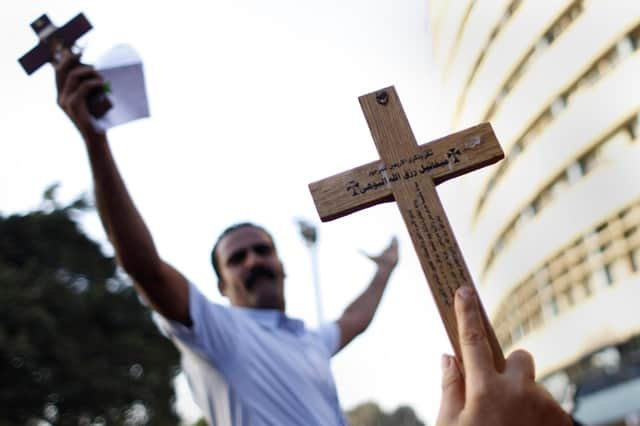Ian Ellis: Safety of Egypt’s church buildings is a major cause for concern


It has been reported that 41 members of the Abu Sefein church congregation in Giza near Cairo died in a fire on August 14, many of them children.
The church is located in the relatively poor Imbaba district of Giza and belongs to the Coptic Oriental Orthodox denomination which traces its roots back to its establishment by St Mark.
Advertisement
Hide AdAdvertisement
Hide AdThis was no normal church building, as we in this part of the world might imagine it, but a meeting place located on the upper storeys of a commercial and residential complex. The reason for this lies in Egypt's laws regarding the building of churches.


Prior to 2016, permits to build or renovate churches required direct presidential approval but while this particular law was relaxed in 2016, difficult regulations remain.
As a result of the legal restrictions, Christians, estimated to be up to only 10 percent of the nation's approximately 100 million population, have sought alternative places to meet for worship and very often they are unsafe.
Although there have been deadly attacks on Christians in Egypt, such as called for by ISIS in 2017, it is understood that the fire at the Abu Sefein church was caused by an electrical fault on an air conditioning unit, leading to a fatal stampede and people suffering from smoke inhalation.
Advertisement
Hide AdAdvertisement
Hide AdAmr Magdi, a senior researcher with the international organisation, Human Rights Watch, was quoted as saying that his organisation is “concerned that we will see more victims of unsafe conditions [in places of worship]”.
Archbishop Angaelos, who leads the Coptic Orthodox community in the UK, commented at the time of the Abu Sefein church fire: “Two bittersweet realities arise from this tragedy. The first is that churches in Egypt are filled by the faithful on a regular basis, and so when tragedy strikes it strikes at a high cost, and at the heart of the community. The second is that tragedy creates a platform for us to recognise and value one another while experiencing each other’s pain and comforting one another through our suffering.”
The archbishop also said that while “much is being said about the cause of the fire, and the response time of emergency services”, the matter should be left to “what we hope and expect will be a robust and transparent investigation”.
Fires caused by electrical faults are understood to be a relatively frequent occurrence in Egypt and according to the New Arab media outlet two other churches in the country suffered from fires in the same week as the Abu Sefein tragedy, and three more in the following week, reportedly without serious casualties.
Advertisement
Hide AdAdvertisement
Hide AdEarlier this year, the Washington-based non-profit organisation, International Christian Concern (ICC), reported how Coptic Christians in Egypt’s Minya Governorate, a region to the south of Cairo, had demonstrated peacefully with the request that the appeal for the reconstruction of their demolished church be granted.
The church was destroyed in 2016 after a fire and was demolished last year but, according to latest information available, the congregation has not yet received a ruling on its request to rebuild it, despite the law setting a four-month limit for considering such an application. ICC reported that in the peaceful protest, about 70 church members chanted “we want to build a church” and “we want to pray”.
Claire Evans, ICC regional manager for Egypt, told me for this column: “The church has still received no response for the request to rebuild. Nine Christians were imprisoned earlier this year for protesting how the authorities have delayed authorization for rebuilding. The charges were ‘participating in an assembly that endangers public peace and committing a terrorist act with the aim of disturbing public security.’ They were released after three months in prison, reportedly the same day as Coptic Easter.”
Archbishop Angaelos has drawn attention to his expectation of an appropriate investigation into the Abu Sefein church fire and it is similarly to be expected that the country's authorities will ensure that the best procedures are fully in place for allowing freedom of religious worship.
l Canon Ian Ellis is a former editor of The Church of Ireland Gazette.